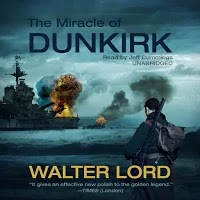The Miracle of Dunkirk by Walter Lord *** (of 4)
During the opening stages of WW II Germany marched virtually unimpeded across its neighbors. British soldiers were sent to France to hold back the German tide, but Germany's soldiers flattened Belgium, turned the corner on France's Maginot Line and pinned Britain's troops against the English Channel. Germany could have, and should have, pushed what really amounted to virtually all of England's army into the sea, mowing over France's along the way. Faced with no option, Britain chose to abandon the continent, save its army to fight another day, and attempted to send enough ships across the notoriously fickle English Channel to rescue on the order of 300,000 men. If the German's succeeded the war might have ended in their favor rather quickly. If England could manage to ship out its army, the Nazis might one day be defeated.
What this book makes clear, perhaps more implicitly than explicitly, is the extraordinary combination of events and personalities that had to combine in just the right order for such an operation to be a success. The weather had to be calm on the water but foggy and cloudy enough to keep the Luftwaffe grounded on most days and had to be so for days on end. Hundreds of British ships of all shapes and sizes had to be mobilized, fueled, outfitted with water and food, and somehow brought close enough to a very shallow beach for men to board. Soldiers had to be patient even while hungry, exhausted, shelled and bombed from the air. Leaders needed to emerge when chaos disrupted carefully laid plans and communications failed. And Germany had to prioritize its attack on Paris, directing its Army south toward the capital instead of first taking the time to finish off England's Army.
When it was over, Winston Churchill gave one of his most famous speeches.
But Churchill also said to a country overjoyed at the return of its sons, husbands, and fathers, "We must be very careful not to assign to this deliverance [Dunkirk] the attributes of a victory. Wars are not won by evacuation."
 |
| More than 300,000 Allied troops were rescued from Dunkirk in 1940. A quick summary. |
When it was over, Winston Churchill gave one of his most famous speeches.
But Churchill also said to a country overjoyed at the return of its sons, husbands, and fathers, "We must be very careful not to assign to this deliverance [Dunkirk] the attributes of a victory. Wars are not won by evacuation."


Comments
Post a Comment